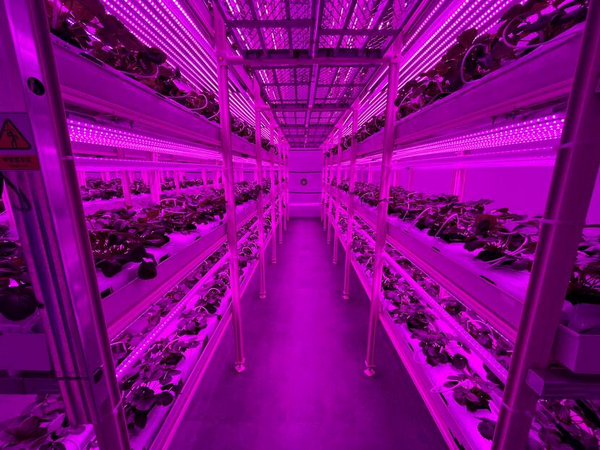"In the Netherlands, vertical farming is considered an expensive and uneconomical business, as it costs a lot for construction, LED, and energy. This kind of business is exceptionally possible in South Korea because the average agricultural produce price is double the world prices in South Korea. Therefore the indoor farm can profit despite the enormous investment and operating costs," as Agroberichten Buitenland states.
Nexton, an LED startup that operates indoor farms, has established the world's largest strawberry vertical indoor farm in Taeback City, Gangwon province of South Korea. An opening ceremony for the 0.5 ha indoor farm on 1.7 ha land occurred on 24 May 2023. This Nexton's 2nd indoor farm has 12 tiers and grows strawberries year-round. There are nine units (1 unit is 330m2) in total, including a nursery, and the company has started operating five units and currently produces 500kg of strawberries daily. When used all, the yearly production will reach 300 tons, equivalent to traditional farming on a 10-ha plastic greenhouse.

Taebaek is a city where the mining industry was prevalent in the past, but all the mines are now closed because South Korea no longer uses coal for heating. To activate the economy in the region, central and regional governments invited Nexton to Taebaek by subsidizing the establishment of the new indoor farm.
Nexton was established in 2017 by three LED experts from Seoul Semiconductor, the world's second-largest LED manufacturer with more than 14,000 patents. Nexton built the 1st farm in 2020 in Okcheon Tunnel, an abandoned highway tunnel that once connected the cities of Daejeon and Daegu in southern South Korea. Nexton transformed the tunnel into incubators for high-quality vegetables, strawberries, and bio-crops.
Nexton can stably produce strawberries thanks to its patented technology on LED lighting that replaces sunlight for plants. Nexton's LED is advantageous for indoor farming with low heat generation. General LEDs used in other indoor farms rise to 67 degrees Celsius which should be controlled by expensive air conditioning. Nexton's LED heat does not rise above 32 degrees. Another strength is its LED design technology that produces the most favorable wavelength for photosynthesis depending on the plant life from nursery to harvesting. Air conditioning technology used in the LED manufacturing plant was also applied to the indoor farm to support vegetable breathing. Bees pollinate the strawberries, and the wavelength of LEDs is adjusted for the health of the pollinating bees. The substrate is cocopeat, and the nutrients and water are recycled.
Nexton thinks Greenhouse is less suitable for growing low-temperature strawberries in tropical or sub-tropical climates. By blocking sunlight for strawberries in the indoor farm, middle Eastern or South-East Asian countries can also grow strawberries. Nexton signed a contract with Kuwait to export the indoor strawberry farm module and is talking with the UAE, Singapore, and Thailand for cooperation.
Source: Agroberichten Buitenland
